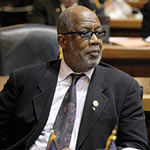Charles Brown (congressman)
Charles Brown ( born September 23, 1797 in Philadelphia, Pennsylvania, † September 4, 1883 in Dover, Delaware ) was an American politician. Between 1841 and 1843, and again from 1847 to 1849, he represented the state of Pennsylvania in the U.S. House of Representatives.
Career
Charles Brown attended the common schools and then moved with his father to Cumberland County in New Jersey. Between 1817 and 1819 he served as an officer in the National Guard of that State. In 1819 he was hired as Town Clerk in Dover; 1820-1821 he worked as a teacher in Dividing Creek. In 1823 he returned to Philadelphia, where he worked in the firewood business. In 1828 he became a director of the School Administrators of Philadelphia. At the same time he proposed as a member of the Democratic Party launched a political career. In the years 1830 and 1831 he sat in the City Council of Philadelphia. From 1830 to 1833 he was a delegate in the House of Representatives from Pennsylvania; 1834-1838 Brown belonged to the Constitutional Convention of Pennsylvania. After that, he was from 1838 to 1841 member of the State Senate.
In the congressional elections of 1840, Brown was the first electoral district of Pennsylvania in the U.S. House of Representatives in Washington DC chosen, where he became the successor of Lemuel Paynter on March 4, 1841. Since he resigned in 1842 to run again, he could prefer to take only one term in Congress until March 3, 1843. This period was characterized by the tensions between President John Tyler and the Whigs. It was also at that time already been discussed about a possible annexation of the independent Republic of Texas since 1836 by Mexico.
In 1843, Brown led the meeting at which the channel Representative of the State of Pennsylvania were nominated. He was also politically active at the local level. In the 1846 elections, he was elected to Congress again in the third district of his state, where he replaced John Hull Campbell on March 4, 1847. Until March 3, 1849, he could spend another term in the U.S. House of Representatives, which was determined by the events of the Mexican- American War. In 1848, he did not run.
Between 1851 and 1853, Brown was one of the Control Commission of the Eastern State Penitentiary, a prison for Eastern Pennsylvania, at. From 1853 to 1857 he directed the customs authorities at the port of Philadelphia. Since 1861 he lived in Dover, where he worked in agriculture. In the years 1864 and 1865 he was employed as a Town Commissioner in the local city government. In August 1866 Brown took part in Philadelphia as a delegate to the National Union Convention. From 1871 to 1878 he was Chairman of the Board for public schools in Dover. He died on September 4, 1883 in Dover, and was buried in Philadelphia.










